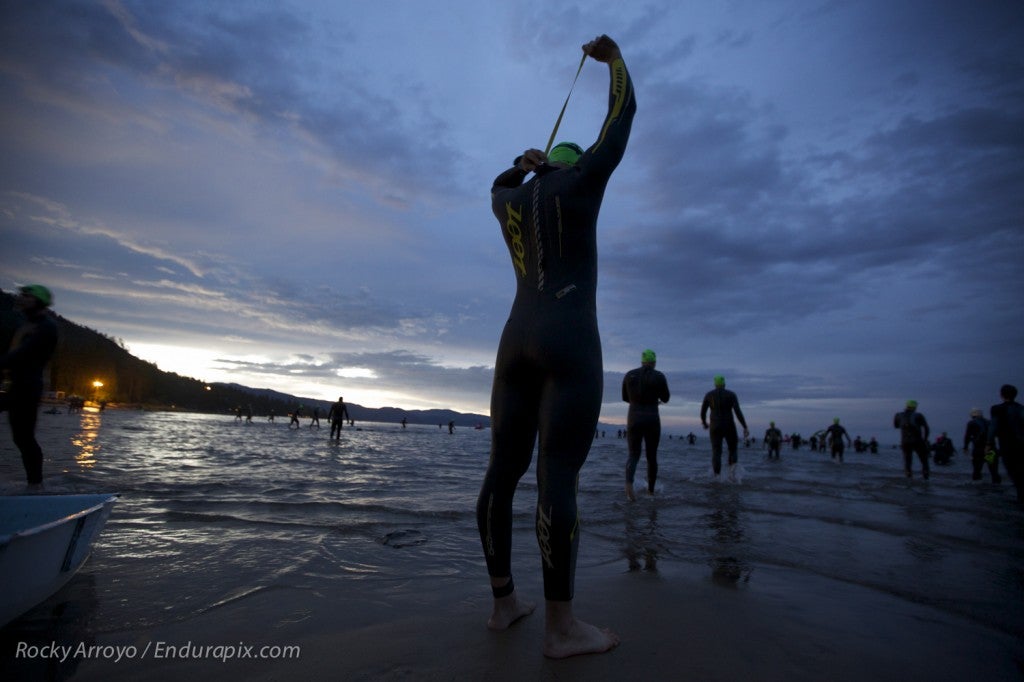Ironman Lake Tahoe Athletes Cope With Cancellation

Athletes prepare for Ironman Lake Tahoe before the cancellation was announced. Photo: Rocky Arroyo
Jake Steen was standing near the starting line in his wetsuit when the announcement was made: mere minutes before the start of Ironman Lake Tahoe, race directors cancelled the event due to a nearby forest fire.
“The speakers in transition were still playing music at that time, so I assumed it was just some silly joke,” recalls Steen. “When I could tell she wasn’t breaking some kind of smirk, I just wandered around in disbelief. I actually didn’t take my wetsuit off until we got back to the cabin.”
From shock to disbelief to anger, emotions ran high after athletes learned the race was cancelled. Many had trained for a year leading up to the event, and were shell-shocked to have their race-day dreams so abruptly dashed.
Such intense feelings of loss are normal, says Dr. Kip Matthews, a sports psychologist based in Athens, Ga. “These athletes had invested significant amounts of time, energy and money to fully prepare for Ironman Lake Tahoe, often at the expense of other commitments and priorities. When the race was cancelled, it would be a normal reaction or initial perception to be that all of training was for nothing.”
Matt Lieto knows that sentiment all too well. The professional triathlete had selected the Lake Tahoe event as the cornerstone of his season, and was distressed upon hearing the news of the cancellation. “I focused my entire season on this weekend…I put my head down for the meat of this season to prepare myself to succeed [at Tahoe], and I wasn’t able to test that work. That is super disappointing.”
Matthews suggests a triathlete’s disappointment may be compounded by a loss of control – a challenge for a sport whose athletes are typically very meticulous. “To get to that level of competition, triathletes have to be very meticulous and control so many aspects of their environment, including nutrition, sleep, and their training schedules. While the reality is that most events in our lives are beyond our control, we often maintain an illusion that we can exert some direct influence on events around us. [At Tahoe], this illusion was likely shattered by the forest fire, because they had no control over that.”
Whether a race is cancelled well in advance or at the very last minute, Matthews encourages athletes to refrain from unhealthy coping mechanisms, such as engaging in all-or-nothing thinking (“this was a complete waste”), being too controlling of their food or training as a way to compensate, or lashing out at the race organizers.
“Instead of engaging in this type of behavior, it is critical athletes conduct a realistic appraisal of their environment and identify what few things they actually do have control over. Focus on those things in pursuit of goals,” says Matthews.
RELATED: Andy Potts On Racing After A Disappointment
For Steen, that realistic appraisal helped shake off the feeling of shock and disbelief. “Seeing how bad the air quality was actually made me feel a little better. It was obvious that the cancellation wasn’t even a decision, it was a no-brainer.”
A good perspective also helps, says Lieto. “All of this pales in comparison to the hardship residents near the King fire are dealing with, and the effort the fire services are putting in to keep them safe. It’s all trivial in comparison.”
Some athletes may regain some sense of purpose by redirecting their energy into an activity that would negate their sense of loss. Matthews cites the 2012 New York City Marathon, which was cancelled in the wake of Hurricane Sandy, as an example: “So many marathoners volunteered to help with the recovery efforts. They took that training and directly applied it to physically helping out those truly in need.”
Other athletes have chosen to reframe the cancellation as a positive. Suzanne Butler, who was set to race the 70.3 distance at Lake Tahoe, has chosen to focus on appreciation instead of contempt.
“I want to express my gratitude for the journey, as opposed to the destination,” says Butler. “I spent a total of 18 glorious days training in Lake Tahoe with friends. I had amazing experiences and plenty of beautiful days. I won’t take a single one for granted.”
Ironman has offered Ironman Lake Tahoe registrants three options: 1. Register for one an upcoming 2014 Ironman race for $100; 2. Register for 2015 Ironman Lake Tahoe for $100; 3. Register for a selected list of 2015 Ironman events for half of the regular registration price.
Lieto, who has decided to take a last-minute entry to Ironman Chattanooga, encourages athletes to make the most of the situation: “If you can, go race. If you can’t, take comfort in the fact that you put the time and effort into participating in one of the most challenging Ironman races on the planet. Not many have the minerals to step up to that start line. You did. Hats off for that.”